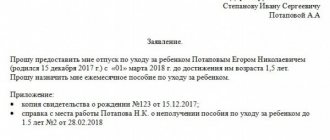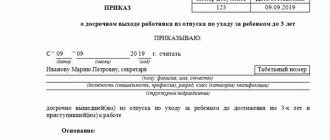What is an abbreviation?
Important! Reduction is one of the types of dismissal of an employee at the initiative of the employer (81 Labor Code of the Russian Federation).
In this case, a distinction is made between both a reduction in the number of employees and a reduction in staff. Reduction of staff means a reduction in the number of employees for one position, for example, a company had 10 people in the position of manager, but only 6 remained. Reduction of staff means the complete elimination of a separate division or identical staff units (
Employer's actions
When a company or other institution, due to a number of reasons, is forced to resort to a reduction procedure, the administration, in turn, is obliged to:
- offer the employee any other available vacancy in exchange (part three of Article 81 of this Code);
- personally warn each employee about the upcoming changes two months in advance, and attest to their awareness with individual signatures;
- having secured the written approval of the employee, terminate the contract with the institution without waiting for the expiration of the notice period (part two of Article 81 of the Code of the Russian Federation);
- pay additional and mandatory compensation, which is the average salary of the dismissed person;
- issue severance pay (Article 178 of the Labor Code of the Russian Federation).
A very important point is to contact the administration of the institution with a proposal to stop interactions between it and the hired worker.
Since the initiative comes from the head of the institution, therefore, he sets the date for termination of the employment relationship. At the same time, the minimum terms provided for by the Labor Code of the Russian Federation are maintained.
Conditions for reduction
It is important for an employer who has decided to make redundancies in a company to comply with certain conditions:
- Notify employees. Employees must be notified about layoffs in advance - no later than 2 months in advance. To do this, each employee who has been laid off must be given a notice. It is compiled in free written form.
- Notify the employment service and the trade union. It is necessary to notify both the employment service and the trade union that the company plans to make layoffs. The trade union body must respond by providing its opinion on the reduction. If such an opinion is not received within 7 days, the employer has the right not to take it into account.
- Offer employees a different position. When laying off employees, the employer should especially take into account those employees who cannot be laid off under the Labor Code. Retrenched employees should also be offered another vacant position in the company, and such a position may not correspond to his qualifications. In case of refusal of the position, the employee is fired.
The procedure for laying off employees
After notifying employees and other authorities, the employer issues a layoff order. The order indicates the reasons for the reduction, the positions being reduced, indicating the number of staff units, the date of dismissal, as well as the persons responsible.
Important! When laying off workers, they are paid compensation for the vacation they did not take, their due salary, as well as other payments due upon layoff.
You can terminate a contract with an employee before two months. This can be done by agreement with the employee in writing. In this case, the employee will need to receive compensation in addition to other payments. The compensation will be equal to the average salary for all days from the date of termination of the contract until the end of the two-month period.
Termination earlier than two months is also possible with the following employees:
- With whom the contract was concluded for a period of less than 2 months. Such employees can be notified 3 days in advance (292 Labor Code of the Russian Federation);
- Seasonal workers are notified 7 days before dismissal (296 Labor Code of the Russian Federation).
Taxation and contributions
There are exceptions to the general rules. If an employment contract is terminated due to the liquidation of an organization or a reduction in its number or staff, a special procedure applies.
When holiday pay paid in advance is not withheld.
- with liquidation; - reduction in the number or staff of the company.
FOR EXAMPLE: Calculation of the number of vacation days used in advance An employee is fired due to a reduction in the number and staff of the organization's employees on October 31, 2014.
During the working year (from April 23, 2014 to April 22, 2015), the employee used 28 calendar days of annual paid leave in August 2014.
It is necessary to determine how many days of vacation the employee took in advance; should overpaid vacation pay be withheld upon his dismissal?
We invite you to read: Penalty under a wiring contract
On the day of dismissal, the length of service giving the right to annual paid leave for the specified working year was 6 months 8 days.
Surpluses amounting to less than half a month are excluded from the calculation, and surpluses amounting to at least half a month are rounded up to the full month.
Thus, in this case, the “vacation” period is 6 months and the employee has the right to 14 calendar days of vacation (28 calendar days: 12 months × 6 months).
14 calendar days (28 days - 14 days) of annual paid leave have been used but not worked.
But the employer does not have the right to withhold the amount of average earnings accrued to the employee for “extra” vacation days.
Thus, the laid-off employee receives a kind of “gift” - a sum of money equal to payment for vacation days falling in the months remaining before the end of the working year.
However, the above calculation is only the first step. We must not forget about taxation and contributions. According to Art. 217 of the Tax Code of the Russian Federation, personal income tax is paid on compensation for vacation in case of staff reduction. Therefore, the dismissed employee will receive a smaller amount.
When calculating personal income tax, you need to keep the following factors in mind:
- Tax rate. For residents, that is, citizens permanently residing in Russia, it is 13%.
- Amount of accrued compensation.
Compensation is not subject to personal income tax only in one case - if the employee died before receiving it, and it is inherited by his relatives (clause 18 of article 217 of the Tax Code of the Russian Federation).
In addition to personal income tax, contributions to the Pension Fund, Social Insurance Fund, and the Federal Compensation Fund are withheld from compensation. The basis for this is clause 2, clause 1 of Art. 422 of the Tax Code of the Russian Federation. These contributions are transferred to the budget in the usual manner, that is, on the 15th day of the month following the dismissal.
Retrenchment of an employee during vacation
Important! An employee can only be dismissed while on vacation on his own initiative. In this case, it is impossible to dismiss at the initiative of the employer (81 Labor Code of the Russian Federation).
Even if the employee was notified in advance in writing about the upcoming layoff, but he went on vacation on the date of dismissal, he cannot be laid off. It would be illegal. The layoff procedure can be carried out only after the employee returns from vacation. It will also not matter what kind of vacation the employee is on; dismissal at the initiative of the employer cannot be for any type of vacation, including:
- Annual leave;
- Leave without pay;
- Maternity leave;
- Holiday to care for the child;
- Study leave.
FAQ
Question No. 1. Who pays benefits to an employee on maternity leave after the company is liquidated?
Answer: FSS bodies.
Question No. 2. What articles of the Labor Code of the Russian Federation regulate the process of dismissal and reduction?
Answer: presented in the table below.
| Article of the Labor Code of the Russian Federation | Characteristic |
| 81 | You can fire an employee while on vacation only if the company is liquidated. |
| Part 1 Article 80 | The employee notifies the employer 14 days in advance of his intention to resign. |
| Part 2 Article 125 | Calling an employee back from vacation for the purpose of dismissing him is prohibited |
| Part 3 Article 80 | An employee can resign while on vacation for a number of reasons. |
| Part 5 Article 137 | If an employee went on vacation earlier than 6 months (from the date of commencement of work), then “illegal” vacation pay will be deducted from the calculation |
Notifying an employee on vacation
You cannot lay off an employee while he is on vacation, but you can notify him of the upcoming layoff. To do this, the employee is notified by registered mail. As confirmation that the employee has been notified, there will be a notification from the mail that the letter has been received by the employee. Instead of mail, you can use courier services. In this case, confirmation of receipt of the notification will be the employee’s signature on the courier’s receipt.
Important! An employee on vacation is considered to have been properly notified of the upcoming layoff if the employer has supporting documents confirming that the notice was delivered to him (a receipt from a courier or mail).
If the employee does not receive the notice, it can be given to him only after he returns to work. When drawing up the notice, the employer must already indicate that if the employee is on vacation or sick leave at the time of layoff, he will be laid off on the first day of work after sick leave or the end of vacation.
Most common mistakes
Mistake No. 1. The most common mistake is missing the deadline for submitting notice to an employee. For regular categories - 2 months in advance, for employees on a fixed-term contract of less than 2 months - a week, for seasonal employees - 3 days.
Mistake No. 2. The most common mistake is the employer’s failure to confirm that the notice was served on the employee. Such confirmation may be: the employee’s signature, a receipt for delivery by courier or mail, or an act of refusal to sign the notification in the presence of two witnesses.
Let's summarize. There are several options for laying off an employee while on vacation, including complete liquidation of the organization. With all other reduction options, the employer’s initiative is not allowed, since vacation and sick leave are periods protected by law. During this time, you cannot fire an employee. Dismissal is possible by agreement of the parties. Moreover, the reason for leave can be different: maternity leave, study, annual, etc. The date of dismissal may be the next day after the end of the vacation.
If the employee refuses to receive notice
There are also situations when an employee deliberately refuses to receive a notification from a courier or by mail. In this case, the employer has no choice but to wait for the employee to return from vacation. If, upon returning to work, the employee does not want to sign for receipt of the notification, the employer must draw up an act of refusal to sign. It is drawn up with at least two witnesses. This act will confirm that the employee has been notified of the upcoming dismissal.
Retrenchment during study leave
It is prohibited to lay off an employee during vacation, even if this vacation is for training. You can fire him only upon returning from vacation. However, if the start date of the vacation occurs after the official day of layoff, then such an employee can be dismissed along with all other employees who were laid off.
Let's look at an example. The employee was duly notified of the upcoming layoff. After that, he brings a certificate from the place of study about a call to defend his diploma for 3 months. Study leave in this case falls on the date of reduction. What should an employer do? Is the employee's vacation time required or can it be reduced? As with any other type of leave, layoffs are prohibited during study leave. The employer will have to wait for the employee to return from study leave (26 Labor Code of the Russian Federation). If the employee’s letter of invitation contains the start date of study leave after the official date of layoff, then the employee can be dismissed along with everyone else.
Termination of an employment contract during vacation at one's own request
Labor legislation , prohibiting forced labor in any of its manifestations, allows the dismissal of an employee at his own request at any period of the work process , be it while on sick leave or on a business trip. Vacation is no exception.
The decision to dismiss has been made. All procedures before formalizing the termination of an employment contract are carried out in the general manner specified in Art. 80 of the Labor Code of the Russian Federation: the employee submits an application 14 days before the date indicated in the document as the last working day or as the day of dismissal.
He also has the right to submit an application in any way convenient for himself:
- in person by going to work;
- by registered mail with notification and a list of attachments;
- by email.
There are usually no problems with an application submitted by an employee in person.
The nuance with registered mail is that you need to add the departure time to the two-week work period, because... the period begins to run the next day after the manager receives the application.
An electronic document must necessarily contain a digital signature of the employee (Article 6 of the Federal Law of 04/06/2011 No. 63 “On Electronic Digital Signature”).
The day of termination of the employment contract is considered to be the date specified in the employee’s application, taking into account the 14 days required by law. Accordingly, the right to withdraw the application is valid until the same date.
It is important to note the situation in which the application is submitted not at the beginning of the vacation, but towards the end. Since according to the rules of Art. 80 of the Labor Code of the Russian Federation, no additional work is assigned; the employee must appear at work as long as remains until the day of dismissal.
How is it processed?
The procedure for dismissal while on vacation is not much different from the usual termination of an employment contract at the request of the employee, but there is a small exception:
Important! If the application is submitted at the beginning of the vacation or the vacation itself is long enough, you will not have to work 2 weeks.
As soon as the employer has received the application and the HR department has registered it, the standard dismissal procedure begins, in which the employee himself does not participate:
- An Order of Dismissal is issued (form T-8 or the organization’s letterhead);
- personnel documents are drawn up (work book, personal card), certificates and information are prepared that must be handed over to the employee;
- The accounting department prepares a calculation note with the amount due to the employee in connection with the dismissal.










